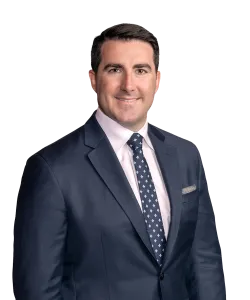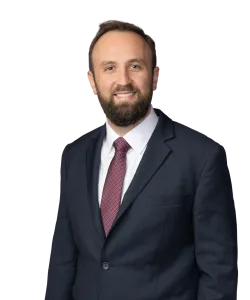DOJ Criminal Division Head Details White-Collar Enforcement Priorities and Related Policy Revisions
Headlines that Matter for Companies and Executives in Regulated Industries
DOJ Criminal Division Head Details White-Collar Enforcement Priorities and Related Policy Revisions
On June 10, the head of the US Department of Justice’s (DOJ) Criminal Division, Matthew R. Galeotti, gave a speech before the American Conference Institute (ACI) outlining the DOJ’s white-collar enforcement priorities. Galeotti’s remarks follow the DOJ’s recent revisions to the Criminal Division Corporate Enforcement and Voluntary Self-Disclosure Policy (CEP).
Read our previous alert about the CEP here.
Galeotti emphasized that if defense counsel representing companies under investigation “do the right thing, report potential crimes, root out misconduct, cooperate with the [DOJ], and help the company remediate,” then the company will receive “significant benefits.” He highlighted three key points:
Companies that “voluntarily self-report, cooperate, and remediate” fraud and other white-collar offenses will receive a declination — not just a “presumption” of declination — unless there are aggravating factors. Galeotti said that he would personally scrutinize cases that do not recommend a declination where there was a voluntary self-disclosure. For there not to be, “circumstances would have to be truly aggravating.”
Galeotti made clear that the Administration disfavors monitorships and believes accountability measures “more quickly transition companies to full compliance” without the “additional burden” on the DOJ. Under his tenure, the Criminal Division did a review of active monitorships and proceeded to terminate those “where circumstances permitted companies to achieve compliance with our agreements on their own,” including by self-reporting and making compliance certifications.
He also emphasized the need for the Criminal Division to act with speed and efficiency. Galeotti has told prosecutors that investigations should not be “sprawling” and unreasonably “lengthy.” For the Criminal Division to act quickly, however, he explained that it is incumbent on subjects to act quickly — “when the delay is due to the conduct of a subject or a target, arguments regarding a supposed lack of efficiency will not resonate.” This means those who are subject to an investigation should, upon request, swiftly produce documents, make witnesses available, and identify key evidence. Defense counsel should also be working closely with prosecutors to narrow disagreements and exhaust discussions.
You can read Galeotti’s speech here.
DOJ Issues New FCPA Guidance
Back in February, President Donald Trump issued an executive order (EO) that put a 180-day pause on enforcement of the Foreign Corrupt Practices Act (FCPA) so that the DOJ could, among other things, “issue updated guidelines or policies” in line with the Administration’s priorities. As we noted in our alert, to comply with the EO, Deputy Attorney General (DAG) Todd Blanche on June 9 issued a memorandum outlining the DOJ’s new FCPA enforcement guidelines that aim to (1) limit “undue burdens on American companies that operate abroad” and (2) target “enforcement actions against conduct that directly undermines U.S. national interests.”
The guidelines direct prosecutors to consider the following “non-exhaustive factors” when deciding whether to initiate an FCPA investigation or enforcement action:
To meet the Administration’s goal of “eliminating” cartels and transnational criminal organizations (TCOs), prosecutors should consider whether the case (1) involves misconduct associated with cartels or TCOs, (2) utilizes money laundering or shell companies to benefit cartels or TCOs, or (3) is “linked to employees of state-owned entities or other foreign officials who have received bribes from Cartels or TCOs.”
Prosecutors should prioritize cases where the violative conduct undermines “U.S. companies’ competitiveness” by “distort[ing] markets” and “disadvantage[ing] law-abiding U.S. companies.” Such cases would involve misconduct that “deprive[s] specific and identifiable U.S. entities of fair access to compete and/or resulted in economic injury to specific and identifiable American companies or individuals.”
Prosecutors should focus on corruption that may threaten “American national security interests,” particularly in the “defense, intelligence, or critical infrastructure” sectors. Moreover, in cases that implicate the Foreign Extortion Prevention Act, which criminalizes the “demand side” of foreign bribery, prosecutors should consider whether “U.S. entities or individuals have been harmed by foreign officials” demanding bribes.
Prosecutors should also avoid cases that only involve “routine business practices” or “corporate conduct that involves de minimis or low-dollar, generally accepted business courtesies.” Rather, prosecutors should focus on cases where the misconduct “bears strong indicia of corrupt intent tied to particular individuals” such as substantial bribe payments, sophisticated efforts to conceal bribes, fraudulent conduct undertaken to effectuate a bribe, and efforts to obstruct justice. In deciding whether to initiate a case, prosecutors should also consider whether a “foreign law enforcement authority” is able and willing to investigate the misconduct.
The memo made clear that the above factors should be considered in addition to those that are traditionally contemplated by prosecutors when exercising their discretion, including those outlined in the Justice Manual. In his remarks before the ACI, Galeotti stressed that “the through line in these guidelines is that they require the vindication of U.S. interests.” He also noted that the Criminal Division closed some of its FCPA matters after considering the above guidance.
You can find DAG Blanche’s memorandum here.
Judge Rejects CVS Health’s Attempt to Evade FCA Jury Verdict
In April, after a four-week trial, a Massachusetts jury found that Omnicare, Inc. violated the False Claims Act (FCA) by filing over 3.3 million false and fraudulent claims, and that its parent company, CVS Health Corporation (CVSHC), caused the submission of 1 million of those claims after it acquired Omnicare. Following the trial, CVSHC filed a motion for a directed verdict of dismissal, arguing that the claims against it should be dismissed because it is merely a holding company with no employees, and that the government’s evidence was insufficient to make out an FCA claim for a non-submitting party. The court denied the motion, meaning that the jury’s verdict against CVSHC stands.
The government alleged that Omnicare engaged in the unlawful dispensing of non-controlled prescription drugs at certain long-term care facilities without valid prescriptions. The government argued that, after acquiring Omnicare, CVSHC was complicit in Omnicare’s wrongdoing by failing to correct these practices, causing Omnicare to submit false claims to Medicare, Medicaid, and TRICARE. Said differently, CVSHC actively participated in submitting the false claims because it was aware of the flaws in Omnicare’s system and allowed it to occur.
CVSHC’s responsibility to oversee Omnicare’s practice stemmed from a Corporate Integrity Agreement (CIA) it entered with the Office of Inspector General of the US Department of Health and Human Services in 2016. The CIA required CVSHC and Omnicare to develop and implement systems to ensure accurate prescription drug labeling, tracking, dispensing, and billing. This included creating procedures to ensure compliance with federal health care program requirements, requiring annual compliance certifications by the chief compliance officer (CCO), and reporting substantial overpayments or probable violations of law.
The evidence showed that CVSHC, through its compliance structure and CCO, was aware of Omnicare’s dispensing practices and the need for corrective action. Despite this knowledge, corrective action was either delayed or was not taken for business reasons, and Omnicare continued to make certifications to the government. The court found that this conduct went beyond passive ownership or oversight — it amounted to knowing ratification of Omnicare’s violations, as CVSHC had the power and obligation to correct the issues but failed to do so. Thus, a reasonable jury could find CVSHC liable for causing the submission of false claims.
Looking ahead, the government has a pending motion asking the court to impose a $542 million civil penalty on Omnicare and a $164.8 million civil penalty on CVSHC. Exercising its prosecutorial discretion, the government argued that it is only seeking “a small fraction” of what could be levied against the defendants to quell any concerns that it is seeking a penalty that is unconstitutionally excessive. The defendants argue that Omnicare’s civil penalties should be capped at the same level as the jury’s $135 million damages award and that CVSHC should not pay any penalties because the jury did not find that it caused any damages to the government.
The case is United States ex rel. Bassan v. Omnicare, Inc., No. 1:15-cv-04179 (D. Mass.).
Government Accuses Medical Billing Company of Violating FCA by Filing Claims for Unnecessary Genetic Tests
Last week, the government filed a lawsuit accusing AIMA Business and Medical Support, LLC, a company that provides medical billing and compliance services, of violating the FCA by allegedly filing claims to Medicare for more than $15 million in medically unnecessary genetic laboratory tests. AIMA is a Florida-based limited liability company with employees based in India. AIMA provided services such as billing Medicare on behalf of health care providers and suppliers.
From August 2018 through August 2019, AIMA allegedly billed Medicare Part B for cancer genetic testing and pharmacogenetic testing on behalf of a diagnostic laboratory, Excellent Laboratories Inc., which did business as Selecta Laboratory. AIMA allegedly did this despite knowing that the tests were not medically necessary and were not ordered by the patient’s treating physician. To be covered by Medicare, the genetic test must be ordered by a treating physician who prescribes it for a specific medical problem and uses the results to treat the underlying problem. Medicare does not cover the costs of genetic tests that are not reasonable and necessary for the diagnosis or treatment of illness.
According to the government, Selecta did not bill Medicare for genetic tests prior to 2018 but saw a dramatic increase in billing after Selecta went through a change of ownership. AIMA was allegedly the only company advising Selecta and submitting claims to Medicare for genetic tests.
You can read the press release issued by the US Attorney’s Office for the Southern District of Florida here. The case is United States v. AIMA Business and Medical Support, LLC, 1:25-cv-22507 (S.D. Fla.).
Members of International Global Digital Asset Investment Fraud Conspiracy Plead Guilty
On June 9, five men who reside in either California or China pleaded guilty for their roles in laundering more than $36.9 million from victims — some of whom reside in the United States — of an international digital asset investment scam conspiracy.
As part of the conspiracy, the defendants convinced victims to transfer funds to accounts controlled by the defendants and their co-conspirators by making them believe that they were investing in digital assets. The co-conspirators contacted victims directly through unsolicited social media interactions, telephone calls, text messages, and online dating services. Upon gaining their trust, the co-conspirators promoted their digital asset investments. After the victims deposited the money, the defendants and their co-conspirators laundered the money through US shell companies, international bank accounts, and digital asset wallets. Eventually, the money would make its way to a single bank account in the Bahamas where it was converted into the stablecoin Tether (USDT) and transferred to a digital asset wallet controlled by individuals in Cambodia. The USDT would then be transferred to the leaders of “scam centers” in Cambodia.
You can read the DOJ’s press release here.
Contacts
- Related Industries
- Related Practices







